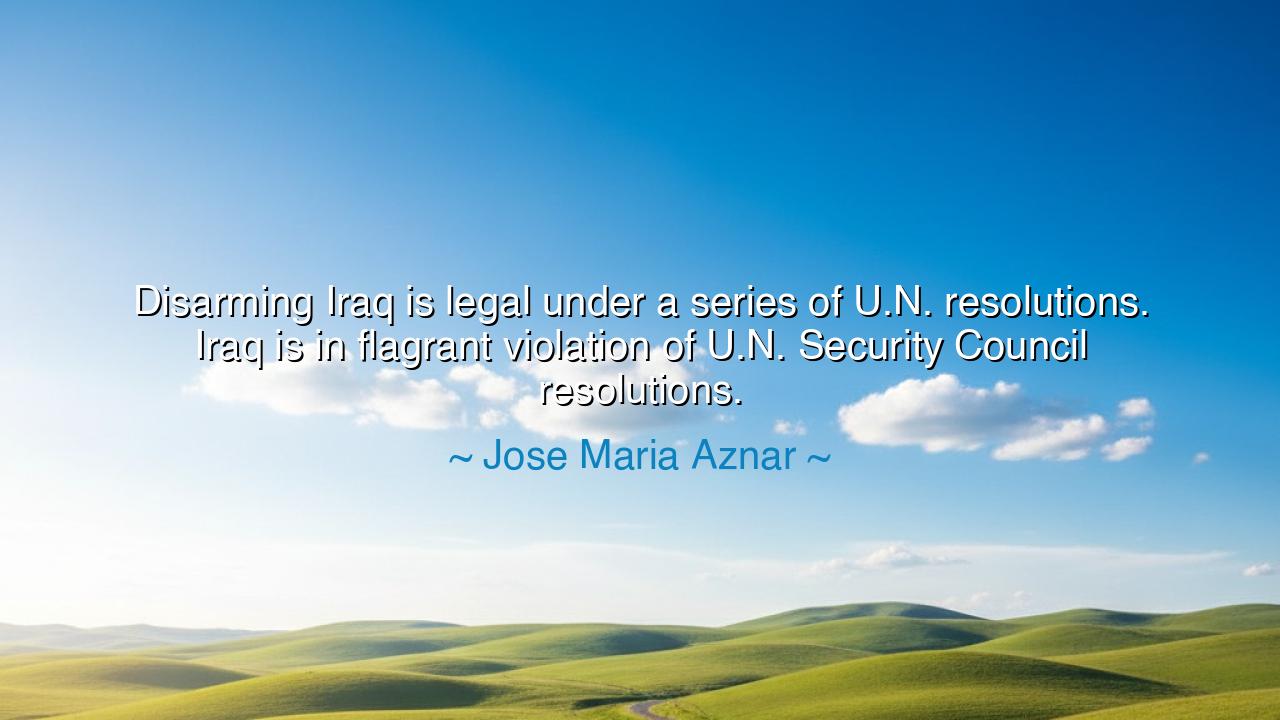
Disarming Iraq is legal under a series of U.N. resolutions. Iraq
Disarming Iraq is legal under a series of U.N. resolutions. Iraq is in flagrant violation of U.N. Security Council resolutions.






When José María Aznar proclaimed, “Disarming Iraq is legal under a series of U.N. resolutions. Iraq is in flagrant violation of U.N. Security Council resolutions,” he spoke not only as a statesman, but as one standing at the crossroads of law and conscience, of order and fear, in a world trembling under the shadow of war. His words echoed across a time when the earth still remembered the smoke of towers fallen and nations wrestled with the meaning of justice and legitimacy. Beneath his statement lies an ancient struggle — the eternal question of how far one may go to defend peace, and whether law can sanctify the sword.
The origin of this quote lies in the years following the attacks of September 11, 2001, when the Western world, led by the United States and its allies, turned its gaze toward Iraq. Aznar, then Prime Minister of Spain, stood among those who supported action to disarm Saddam Hussein’s regime, claiming it defied international law by possessing or concealing weapons of mass destruction. To him, the justification was not only political, but legal and moral, grounded in a series of United Nations resolutions that demanded Iraq’s compliance after the Gulf War. His declaration was an appeal to order — to the idea that nations, like individuals, must be held accountable to the laws of the world community.
Yet within those words also burns a deeper tension — the tension between law and interpretation, between what is declared and what is believed. For though Aznar invoked the U.N. resolutions, many questioned whether the path to disarmament required war, or whether war itself would shatter the very peace the law was meant to preserve. Here, we find the ancient dilemma that haunted empires and republics alike: can the use of force ever be truly lawful if it brings suffering to the innocent? The Roman philosopher Cicero once wrote, “Laws are silent in times of war,” yet the wise know that when law falls silent, humanity trembles.
Aznar’s words reflect a conviction — that law must not be ignored when evil defies it, and that passivity in the face of defiance breeds chaos. His belief mirrors the resolve of nations who, after the horrors of the twentieth century, built the United Nations as a temple of reason against the barbarism of war. To him, Iraq’s refusal to comply with the Security Council was not merely disobedience; it was a threat to the moral order of nations, a rejection of the fragile covenant that held civilization together. Thus, his call for disarmament was not only political — it was an appeal to the sanctity of collective responsibility, that no nation may defy the will of the world and still claim sovereignty without consequence.
But history, like judgment, is never simple. The invasion that followed brought controversy, sorrow, and division. The weapons sought were never found, and many began to question the moral cost of acting upon uncertain grounds. Yet within this failure lies a timeless lesson: that even when guided by law, power must remain humble before truth. For law without wisdom becomes tyranny, and justice without compassion becomes vengeance. Aznar’s words, though spoken in defense of action, now serve also as a warning — that the interpretation of law can kindle both order and ruin, depending on the heart that wields it.
Throughout history, rulers and prophets alike have struggled to define the boundaries of just action. When King David raised his sword against Goliath, it was in defense of a people, not in defiance of the divine order. When Emperor Ashoka of India witnessed the slaughter of Kalinga, he turned from conquest to compassion, realizing that the true victory lies not in domination, but in righteousness. So too must modern leaders heed this wisdom — that legal justification is not enough; moral clarity must walk beside it. For only when law and conscience march in unison can peace be born of conflict.
Thus, let this teaching endure: Law must be a guardian, not a weapon. When nations invoke it, they must do so not out of fear or ambition, but out of reverence for truth and for life itself. The lesson of Aznar’s words is not merely about Iraq, nor about one moment in history — it is about the eternal duty of humankind to align power with principle. To act justly is not to act hastily; to defend peace is not to destroy it in the name of order. Let the generations remember: legality must serve morality, or the world will forever wage war beneath the banner of its own laws.






AAdministratorAdministrator
Welcome, honored guests. Please leave a comment, we will respond soon